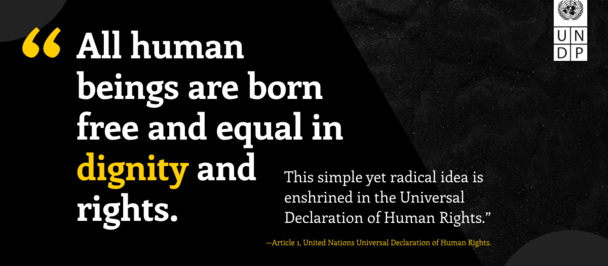New York, June 30 - The high-level meeting on ‘Strengthening the Rule of Law and Human Rights for Sustaining Peace and Fostering Development,’ organized by the United Nations Development Programme (UNDP) virtually brought together, UN Member States, governments, UN agencies, civil society organizations, relevant experts and actors, to enable collaboration and outline priorities for improving rule of law in crisis-affected contexts.
The 2019 Annual Rule of Law and Human Rights Report Highlights was formally launched by UNDP at the event, which captures numerous country, regional, and global results achieved together with partners in nearly 40 crisis-affected contexts around the world.
In his key note remarks, UNDP Administrator Achim Steiner stated that the global network of UN Member states, United Nations and UNDP staff, public servants, NGOs and individuals represent the collective commitment to strengthen the Rule of Law and Human Rights to achieve the 2030 Agenda. Emphasizing on the urgency of obligations to respect human rights and the rule of law in the current context around COVID-19 pandemic, he further stated- “It is clear that securing the rule of law and human rights is key to achieving the transformational change we need - based on principles of trust, accountability and justice. This ultimately means forging a new, more inclusive social contract.”
Delegates stressed on the linkages between the rule of law and human rights and its effects on the three pillars of the UN Charter – development, peace and security to achieve a sustainable, inclusive and resilient future.
Key partnerships for the rule of law and human rights were featured throughout the event, including the Global Focal Point for the Rule of Law co-led by UNDP and the Department of peace Operations, Tri-Partite Partnership to Support National Human Rights Institutions (TPP), Saving Lives Entity (SALIENT), the joint UNDP-UNHCR partnership on Rule of Law and Local Governance, the Gender Justice Initiative with UN Women, as well as its other engagements across the system in the rule of law and human rights.
An online consultation, The Future We Want To See: Re-imagining Rule Of Law, Security and Human Rights and the Inclusive Social Contract, was launched on the occasion. Simultaneously UNDP’s Programmatic Engagement on Business and Human Rights was also released to reflect on the successes, challenges and to identify contemporary challenges and emerging trends on the ground.
George Conway, Deputy-Director of Crisis Bureau and Katy Thompson, Head of Rule of Law, Justice and Human Rights Team closed the high-level session on behalf of Asako Okai, Director of Crisis Bureau- “In order to tackle the far-reaching consequences of COVID-19, increased conflict and exclusion; continued perceptions of injustice; and shrinking civic space we must work towards peaceful, just, and inclusive societies. Rule of law, security, and human rights institutions are key to sustaining cohesive societies, as well as protecting and respecting international human rights standards, the right to access justice, and due process.”
The high level segment of the meeting was attended by ministerial representatives from countries from Bangladesh, Burkina Faso, and Armenia; representatives of UN Member States; technical specialists; Global Focal Point partners and UN entities (EOSG, UNDP, DPO, OHCHR, UNODC, and UN Women), think tanks; and civil society.
Other Quotes:
H.E Mr. Anisul Huq, Minister, Ministry of Law, Justice and Parliamentary Affairs, Bangladesh- “As in any legal instrument, both parties of the agreement have their duties and obligation which needs to be upheld for a country to be progressed. In this instance, it means to recover from the pandemic, build back better and get back on track with the targets of the social development goals.”
H.E Mr. Bessolé René Bagoro, Minister of Justice, Burkina Faso- “Burkina Faso wishes, on the one hand, to be enriched by the experience of other nations of the world and, on the other hand, to benefit from the technical and financial support of countries of brothers and friends, the specialized agencies of the United Nations system, international non-governmental organizations and all resource persons so that the political will strongly displayed through the actions already undertaken becomes a reality for the promotion and effectiveness of the rule of law and human rights.”
H.E. Ambassador Mr. James Roscoe, Deputy Permanent Representative to the United Kingdom Mission to the UN- “SDG16 is often called the ‘enabler’ of the SDGs. Because it provides for a social contract that guarantees inclusive decision-making, and delivers redress when that contract is not upheld. The UK’s firm belief that this social contract is foundational for peace and development is why we support rule of law programming extensively around the globe. And it is why we are so proud to support this UNDP Global Programme.”
H.E. Ambassador Mr. Magnus Lennartsson, Ambassador, Deputy-Permanent Representative of Sweden to the United Nations, Permanent Mission of Sweden- “The pandemic have clearly demonstrated that it is important to focus on rule of law, human rights and governance. Stronger systems, structures and institutions for increased respect for human rights, democratic development and rule of law will be critical for building back better.
H.E. Mr. Yoshimitsu Yamauchi, Assistant Vice-Minister of Justice, Japan- “The COVID-19 exposes structural inequalities in the societies and lack of capacity of governments to effectively respond to the situation. There are worrying signs of threatening social cohesions and restrictions imposing in the name of emergency measures that undermine the rule of law and raises human rights concerns.”
Mr. Clemens Hach, Head of Division for crisis prevention, stabilization and peacebuilding from the Foreign Office Germany- “Focusing on a people centered peace-concept, we have jointly developed together with UNDP the concept of stabilistaion facilities in various crisis settings, to bring a holistic approach to stablisation areas in the past years.”
*********
For more information or media queries: Sangita Khadka, Communications Specialist, UNDP New York, email: sangita.khadka@undp.org

 Locations
Locations



